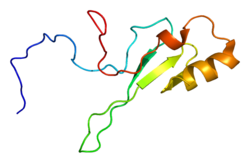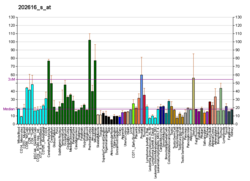MECP2 (methyl CpG binding protein 2) is a gene[5] that encodes the protein MECP2.[6] MECP2 appears to be essential for the normal function of nerve cells. The protein seems to be particularly important for mature nerve cells, where it is present in high levels. The MECP2 protein is likely to be involved in turning off ("repressing" or "silencing") several other genes. This prevents the genes from making proteins when they are not needed. Recent work has shown that MECP2 can also activate other genes.[7] The MECP2 gene is located on the long (q) arm of the X chromosome in band 28 ("Xq28"), from base pair 152,808,110 to base pair 152,878,611.
MECP2 is an important reader of DNA methylation. Its methyl-CpG-binding (MBD) domain recognizes and binds 5-mC regions. MECP2 is X-linked and subject to X inactivation. MECP2 gene mutations are the cause of most cases of Rett syndrome, a progressive neurologic developmental disorder and one of the most common causes of cognitive disability in females.[8] At least 53 disease-causing mutations in this gene have been discovered.[9]
- ^ a b c GRCh38: Ensembl release 89: ENSG00000169057 – Ensembl, May 2017
- ^ a b c GRCm38: Ensembl release 89: ENSMUSG00000031393 – Ensembl, May 2017
- ^ "Human PubMed Reference:". National Center for Biotechnology Information, U.S. National Library of Medicine.
- ^ "Mouse PubMed Reference:". National Center for Biotechnology Information, U.S. National Library of Medicine.
- ^ Amir RE, Van den Veyver IB, Wan M, Tran CQ, Francke U, Zoghbi HY (October 1999). "Rett syndrome is caused by mutations in X-linked MECP2, encoding methyl-CpG-binding protein 2". Nat. Genet. 23 (2): 185–8. doi:10.1038/13810. PMID 10508514. S2CID 3350350.
- ^ Lewis JD, Meehan RR, Henzel WJ, Maurer-Fogy I, Jeppesen P, Klein F, Bird A (June 1992). "Purification, sequence, and cellular localization of a novel chromosomal protein that binds to methylated DNA". Cell. 69 (6): 905–14. doi:10.1016/0092-8674(92)90610-O. PMID 1606614. S2CID 6825994.
- ^ Chahrour M, et al. (2008). "MECP2, a key contributor to neurological disease, activates and represses transcription". Science. 320 (5880): 1224–9. Bibcode:2008Sci...320.1224C. doi:10.1126/science.1153252. PMC 2443785. PMID 18511691.
- ^ "Entrez Gene: MECP2 methyl CpG binding protein 2 (Rett syndrome)".
- ^ Šimčíková D, Heneberg P (December 2019). "Refinement of evolutionary medicine predictions based on clinical evidence for the manifestations of Mendelian diseases". Scientific Reports. 9 (1): 18577. Bibcode:2019NatSR...918577S. doi:10.1038/s41598-019-54976-4. PMC 6901466. PMID 31819097.







